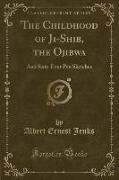Read more
Excerpt from The Childhood of Ji-Shib, the Ojibwa: And Sixty-Four Pen Sketches
For ages before the White Man came, America was the home of the Red Man; and the Red Man and his kindred lived 1n closer touch with nature than his pale -face follower dreams.
When the White Man came there were more than a thousand tribes of Red Men in America, and they spoke about a hun dred different languages, each more unlike the others than the English is unlike the Russian. The largest linguistic family lived about the St. Lawrence river and the Great Lakes, and pushed over the plains southward to Tennessee, northward to Hudson bay, and westward to the Rocky mountains in Canada. They are known as the Algon quian family. In early times there weremany tribes and some confederacies in this family; one of the largest tribes was the Ojibwa, or Chippewa, whose descendants still live in Wisconsin, Minnesota and Canada.
Before they learned the White Man's faith, all Indians were nearly alike in be lief; they all believed in animal gods, and they all believed that the ancient animals were larger and stronger than those now living. Some of the Red Men believed that the world was created by a Great Ancient Muskrat; and if asked why, they would say, Even the little muskrat of today adds to the world by building his house of mud and grass. Others believed that the Great Ancient Beaver was the world-maker; for does not his little grandson build dams and make great meadows? So the Red Men held the animals sacred; when they killed one they made a sacrifice to its kind; and they imputed to all the animals, and to all things that reminded them of animals, all sorts of mysterious powers. Among some tribes even now, each person, and especially each warrior, is supposed to have his own particular animal tutelary or guardian, whichhe calls his Totem; he believes that this animal god aids him and protects him in all his comings and goings; he wears or carries a symbol of this mysterious guardian as a fetish; and he may even take the name by which the animal is known in his language.
About the Publisher
Forgotten Books publishes hundreds of thousands of rare and classic books. Find more at www.forgottenbooks.com
This book is a reproduction of an important historical work. Forgotten Books uses state-of-the-art technology to digitally reconstruct the work, preserving the original format whilst repairing imperfections present in the aged copy. In rare cases, an imperfection in the original, such as a blemish or missing page, may be replicated in our edition. We do, however, repair the vast majority of imperfections successfully; any imperfections that remain are intentionally left to preserve the state of such historical works.

